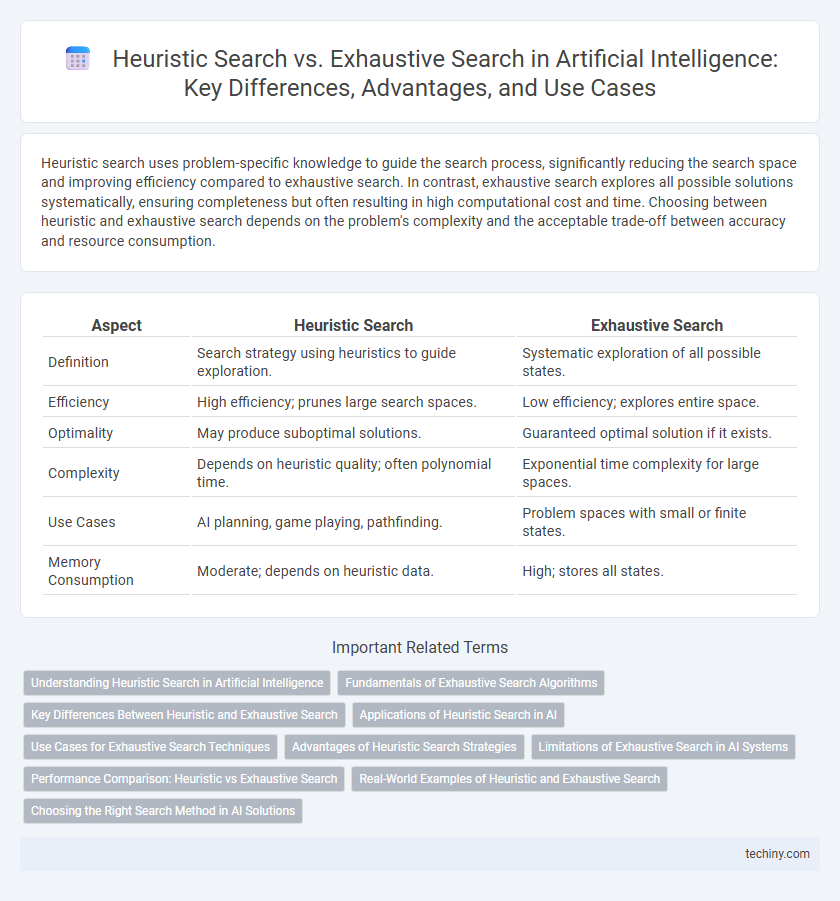Heuristic search uses problem-specific knowledge to guide the search process, significantly reducing the search space and improving efficiency compared to exhaustive search. In contrast, exhaustive search explores all possible solutions systematically, ensuring completeness but often resulting in high computational cost and time. Choosing between heuristic and exhaustive search depends on the problem's complexity and the acceptable trade-off between accuracy and resource consumption.
Table of Comparison
| Aspect | Heuristic Search | Exhaustive Search |
|---|---|---|
| Definition | Search strategy using heuristics to guide exploration. | Systematic exploration of all possible states. |
| Efficiency | High efficiency; prunes large search spaces. | Low efficiency; explores entire space. |
| Optimality | May produce suboptimal solutions. | Guaranteed optimal solution if it exists. |
| Complexity | Depends on heuristic quality; often polynomial time. | Exponential time complexity for large spaces. |
| Use Cases | AI planning, game playing, pathfinding. | Problem spaces with small or finite states. |
| Memory Consumption | Moderate; depends on heuristic data. | High; stores all states. |
Understanding Heuristic Search in Artificial Intelligence
Heuristic search in artificial intelligence leverages problem-specific knowledge to efficiently explore the search space, significantly reducing computational time compared to exhaustive search methods that evaluate every possible option. By prioritizing paths that appear more promising based on heuristic functions, AI systems can make faster decisions in complex environments. This approach enhances performance in applications such as pathfinding, game playing, and optimization problems where exhaustive search is computationally impractical.
Fundamentals of Exhaustive Search Algorithms
Exhaustive search algorithms systematically explore all possible solutions within a defined problem space to guarantee an optimal result, leveraging complete enumeration techniques. These algorithms, such as brute force and backtracking, operate on the principle of traversing every candidate state without approximation or pruning. The fundamental advantage lies in their thoroughness and certainty, but they face significant computational challenges, particularly with large or complex datasets where the solution space grows exponentially.
Key Differences Between Heuristic and Exhaustive Search
Heuristic search utilizes domain-specific knowledge to efficiently explore the search space by prioritizing promising paths, significantly reducing computational time compared to exhaustive search, which systematically examines all possible states. Exhaustive search guarantees finding an optimal solution by evaluating every potential option but suffers from exponential time complexity, making it impractical for large or complex problems. Heuristic search trades off completeness and optimality for speed and scalability, relying on evaluation functions or heuristics to guide the search process effectively.
Applications of Heuristic Search in AI
Heuristic search algorithms, such as A* and greedy best-first search, are widely applied in AI fields like robotics pathfinding, game playing, and natural language processing to efficiently find solutions by estimating the most promising paths. Unlike exhaustive search, which evaluates all possible states, heuristic methods leverage domain-specific knowledge to significantly reduce computational complexity and improve performance in real-time decision-making systems. These algorithms enable AI agents to solve complex problems such as maze navigation, autonomous vehicle routing, and strategic gameplay within feasible timeframes.
Use Cases for Exhaustive Search Techniques
Exhaustive search techniques are highly effective in solving problems with small to moderate search spaces, such as puzzle solving, constraint satisfaction problems, and optimization tasks where completeness is critical. These methods guarantee finding the optimal solution by systematically exploring every possible option, making them invaluable in scenarios like game playing (e.g., chess or Sudoku), combinatorial problem solving, and verification of hardware and software correctness. The trade-off involves high computational cost, but exhaustive search remains essential when accuracy and solution optimality surpass efficiency concerns.
Advantages of Heuristic Search Strategies
Heuristic search strategies significantly reduce computational time by guiding the search process with domain-specific knowledge, enabling faster solutions in complex problem spaces. These methods improve efficiency by prioritizing promising paths, avoiding the exhaustive evaluation of all possible states typical of exhaustive search. This targeted approach enhances scalability and applicability in areas like game playing, route optimization, and AI planning where exhaustive search is computationally prohibitive.
Limitations of Exhaustive Search in AI Systems
Exhaustive search in AI systems faces significant limitations due to its exponential time complexity and high computational resource demands when exploring large or infinite state spaces. This approach becomes impractical for complex problems as it systematically evaluates every possible option without leveraging problem-specific knowledge or constraints. Consequently, heuristic search techniques often provide more efficient alternatives by guiding the search process through informed estimations to quickly identify optimal or near-optimal solutions.
Performance Comparison: Heuristic vs Exhaustive Search
Heuristic search algorithms significantly outperform exhaustive search by reducing the search space through informed estimations, enabling faster and more efficient problem-solving in large, complex environments. Exhaustive search guarantees finding the optimal solution but suffers from combinatorial explosion, leading to impractical runtimes in high-dimensional or real-time scenarios. The performance advantage of heuristic methods depends heavily on the quality of the heuristic function, with well-designed heuristics striking a balance between solution optimality and computational efficiency.
Real-World Examples of Heuristic and Exhaustive Search
Heuristic search algorithms like A* and greedy best-first search efficiently solve complex problems such as route planning in GPS navigation and game AI decision-making by using domain-specific knowledge to estimate the best path. Exhaustive search methods, including brute-force algorithms, are applied in tasks like cryptographic key cracking and puzzle solving where exploring every possible solution guarantees finding the optimal answer despite high computational costs. Real-world AI systems balance heuristic approaches for timely solutions with exhaustive search in scenarios demanding exhaustive accuracy and completeness.
Choosing the Right Search Method in AI Solutions
Heuristic search utilizes problem-specific knowledge to efficiently navigate large search spaces, significantly reducing computational time compared to exhaustive search methods, which systematically explore all possibilities. In AI solutions, choosing heuristic search is optimal for problems with vast or complex states where quick, near-optimal solutions are needed, while exhaustive search guarantees finding the best solution but requires high computational resources and time. Balancing solution quality and available computational capacity is crucial when selecting between heuristic and exhaustive search strategies in artificial intelligence applications.
Heuristic Search vs Exhaustive Search Infographic

 techiny.com
techiny.com